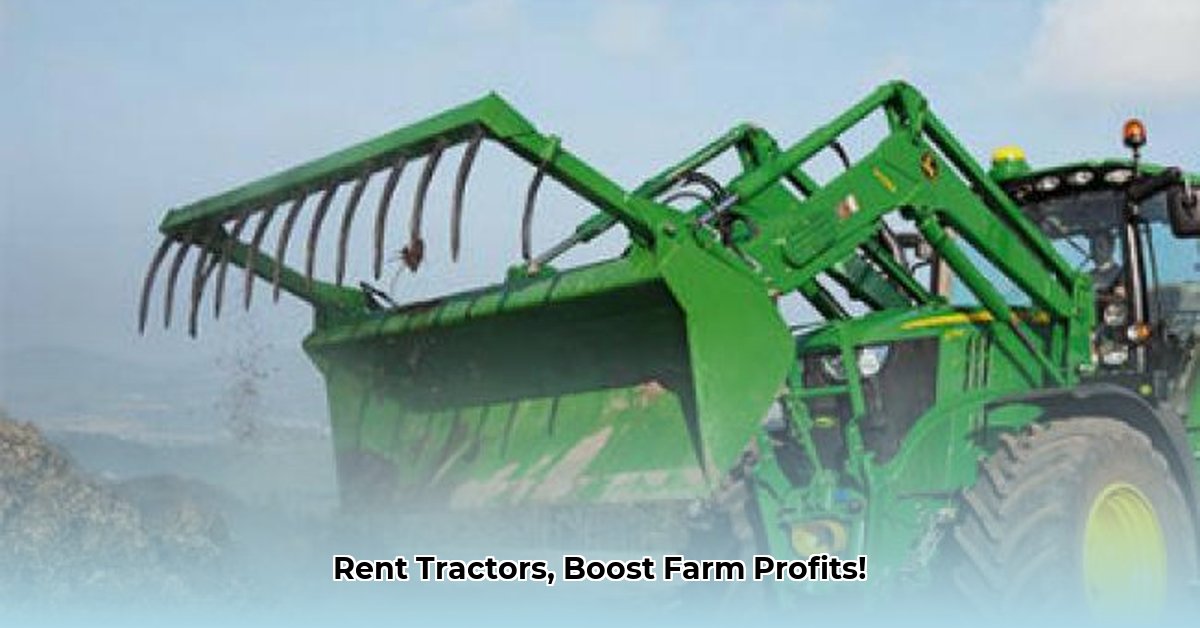
Agricultural Tractor Rental: A Smarter, More Sustainable Approach to Farming
Farming is a demanding profession, characterized by long hours, unpredictable weather, and escalating costs. The financial burden of owning and maintaining expensive equipment can often feel overwhelming. However, a solution exists that can significantly alleviate these pressures while simultaneously promoting sustainable agricultural practices: agricultural tractor rental. This article explores the multifaceted benefits of tractor rental, offering a comprehensive guide for farmers seeking to enhance operational efficiency and profitability. For a wider selection of heavy-duty options, check out these heavy-duty tractors.
Are you grappling with the high upfront costs associated with purchasing new machinery? Agricultural tractor rental provides a cost-effective alternative, allowing you to access the specific equipment you need, precisely when you need it. This short-term solution eliminates the substantial financial investment required for ownership.
Ditch the Debt, Drive Efficiency: The Economic Advantages of Rental
The financial implications of purchasing a new tractor are substantial. The initial purchase price is just the beginning; ongoing maintenance, repairs, and depreciation significantly inflate the total cost of ownership. Consider this scenario: you require a specialized tiller for a single field. Purchasing a brand-new tiller would be economically unviable. Agricultural tractor rental offers a solution to this very problem. By renting, farmers can access the required equipment without committing to a large capital expenditure. Furthermore, rental contracts frequently include routine maintenance, streamlining operations and minimizing unforeseen repair costs.
Finding the Right Tractor for Your Needs: A Comprehensive Guide
Agricultural tractor rentals offer a wide variety of equipment to suit diverse farming operations. Choosing the right tractor hinges on several key factors:
Tractor Types: The market ranges from compact utility tractors ideal for smaller fields and tasks like mowing, to powerful row-crop tractors designed for extensive acreage and heavy-duty work. Consider your field size, crop types, and typical workload when making your selection.
Attachments: The Power Take-Off (PTO) shaft (a drive mechanism that transmits power from the tractor's engine to external implements) unlocks a world of versatility. A single tractor can perform a multitude of tasks simply by attaching different implements; a tiller for soil preparation, a mower for harvesting, or a front-end loader for material handling. This versatility eliminates the need to purchase multiple pieces of equipment.
Rental Terms: Rental terms are flexible, catering to individual needs. Short-term rentals are suitable for one-off projects, while longer-term rentals prove more economical for extended periods or seasonal demands.
Sustainable Farming: Rent Your Way to a Greener Future
Agricultural tractor rental can contribute significantly to sustainable farming practices. Rental companies often maintain fleets of newer, more fuel-efficient tractors and implements, potentially reducing their carbon footprint compared to older equipment. Access to specialized equipment designed for precision farming also facilitates resource optimization and minimizes waste generation. This translates to reduced fuel consumption and a greener overall footprint.
Navigating the Regulations: Legal Compliance in Tractor Rental
Understanding the legal framework surrounding agricultural equipment is paramount. Reputable rental companies ensure their equipment complies with all safety and environmental standards, providing clients with clear information to ensure regulatory adherence. This minimizes potential legal issues and ensures peace of mind for the farmer.
The Numbers Game: A Comparative Analysis of Rental vs. Purchase
The decision to rent or buy agricultural equipment rests upon a careful financial analysis. Consider the following comparison:
| Feature | Tractor Rental | Tractor Purchase |
|---|---|---|
| Upfront Cost | Significantly Lower | Very High |
| Ongoing Maintenance | Often Included (Check the contract!) | Your Responsibility |
| Depreciation | None | Substantial, reducing value over time |
| Flexibility | High (Rent only when needed) | Low (Owned regardless of usage) |
Your Step-by-Step Guide to Successful Tractor Rental
Renting a tractor effectively involves a structured approach:
- Assess Your Needs: Define your specific requirements and the tasks the tractor will perform.
- Research Rental Providers: Compare different rental companies, assessing their equipment, rates, and customer reviews.
- Negotiate Terms: Clarify rental periods, insurance coverage, and maintenance responsibilities.
- Arrange Pickup/Delivery: Coordinate logistics to minimize downtime.
- Inspect the Equipment: Thoroughly examine the tractor before use, documenting any pre-existing damage.
- Operate Safely: Prioritize safety and adhere to operating instructions.
- Return on Time: Adhere to the return schedule to avoid penalties.
The Future of Farm Equipment: Embracing the Rental Revolution
The agricultural equipment rental sector is dynamic, constantly evolving with technological advancements. Rental companies are at the forefront of innovation, offering farmers access to cutting-edge technology without the considerable expense of outright purchase. This access to advanced machinery enhances efficiency, improves yields, and ultimately, boosts profitability.
Choosing Sustainable Farm Equipment Rentals: A Guide to Environmentally Conscious Farming
Key Takeaways:
- Renting offers cost savings and flexibility, particularly for specialized equipment needed for short periods.
- Sustainable equipment rentals minimize your environmental impact.
- Consider fuel efficiency, emissions, and noise levels when making your selection.
- Proper maintenance contributes to equipment longevity and sustainability.
- Prioritize rental options offering lower carbon footprint equipment.
Choosing sustainable farm equipment rentals isn't merely a trend; it's a responsible business practice. By making informed decisions, farmers can significantly reduce their environmental impact while simultaneously enhancing their operational efficiency and profitability. Embrace the future of farming – a future powered by sustainable practices and smart, cost-effective solutions.